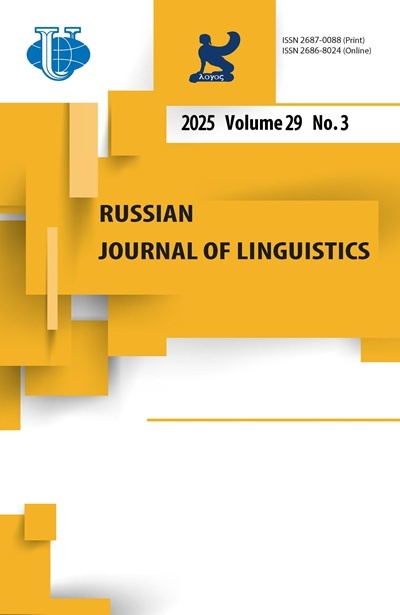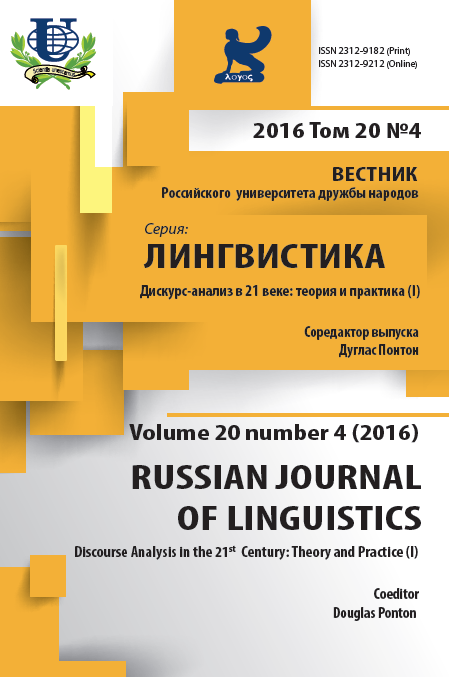Диалогический подход к прагматике
- Авторы: Кечкеш И.1
-
Учреждения:
- Университет Штата Нью-Йорк
- Выпуск: Том 20, № 4 (2016): Дискурс-анализ в 21 веке: теория и практика (I)
- Страницы: 26-42
- Раздел: Статьи
- URL: https://journals.rudn.ru/linguistics/article/view/15146
- DOI: https://doi.org/10.22363/2687-0088-15146
- ID: 15146
Цитировать
Полный текст
Аннотация
В данной статье показано, как преодолеваются границы прагматики, ориентированной на одно высказывание, когда слушающий становится не только реципиентом, пытающимся понять смысл услышанного, но также и собеседником, стремящимся достичь взаимопонимания с говорящим. Цель статьи - не столько описать и проанализировать диалогический подход к прагматике, сколько объяснить, какие внутренние процессы развития прагматической парадигмы послужили стимулом к изучению диалога, и, в особенности, подчеркнуть важность оценки значения высказывания говорящего именно с точки зрения говорящего, а не слушающего, а также указать на двойнную роль собеседников (говорящий-слушающий) в диалоге.
Ключевые слова
Об авторах
Иштван Кечкеш
Университет Штата Нью-Йорк
Автор, ответственный за переписку.
Email: ikecskes@albany.edu
12222, Олбани, США, 1400 Washington Ave
Список литературы
- Airenti, Gabriella, Bruno G. Bara, & Colombetti Marco. 1993. Conversation and behavior games in the pragmatics of dialogue. Cognitive Science 17(2). 197-256
- Bach, Kent. 2001. You don’t say? Synthese. 128: 15-44
- Bach, Kent. 2005. “Context ex Machina”. In Semantics vs. Pragmatics, Szabó Zoltán Gendler (ed.), 15-44. Oxford: Oxford University Press
- Bach, Kent. 2007. “Regressions in pragmatics (and semantics).” In Pragmatics (Advances in Linguistics), Burton-Roberts Noël (ed.), 24-44. Houndmills: Palgrave-Macmillan
- Bara, Bruno. 2011. Cognitive pragmatics: The mental processes of communication. Intercultural Pragmatics 8-3 (2011), 443-485
- Barr, Dale J. 2004. “Establishing conventional communication systems: Is common knowledge necessary?” Cognitive Science 28.6: 937-962
- Barr, Dale J. and Boaz, Keysar. 2005. “Making sense of how we make sense: The paradox of egocentrism in language use.” In Figurative Language Comprehension: Social and cultural influences, Colston Herbert L. and Albert N. Katz (eds), 21-43. Mahwah, N. J.: Lawrence Erlbaum
- Buber, M. 1955. Dialogue. In between man and man (R. G. Smith, Trans.; pp. 1-39). Boston, MA: Beacon Press
- Bunt, H.C. 2011. The Semantics of Dialogue Acts. Proceedings 9th International Conference on Computational Semantics (IWCS 2011). Bos, J. & Pulman, S. (eds.). Oxford, UK: Oxford University, p. 1-14
- Burton-Roberts, Noël. 2006. “Cancellation and intention.” Newcastle Working Papers in Linguistics 12: 1-12
- Carbaugh, Donal. 2013. On Dialogue Studies. Journal of Dialogue Studies 1.1 (2013): 9-28
- Carston, Robyn. 2002. Thoughts and Utterances: The pragmatics of explicit communication. Oxford: Blackwell
- Cooren, F. 2010. Action and agency in dialogue: Passion, incarnation, and ventriloquism. Amsterdam/Philadelphia: John Benjamins
- Davis, Wayne. 1998. Conversational Implicature: Intention, convention and principle in the failure of Gricean theory. Cambridge: Cambridge University Press
- de Saussure, Louis. 2007. Pragmatic Issues in Discourse Analysis. Critical Approaches to Discourse Analysis. Across Disciplines 1 (1): 179-195
- GarfinkeI, H. 1972. Remarks on ethnomethodology. In J.J. Gumperz & D.H. Hymes (Eds.) Directions in sociolinguistics. New York: Holt, Rinehart & Winston
- Giora, Rachel. 1997. “Understanding figurative and literal language: The graded salience hypothesis.” Cognitive Linguistics 8.3: 183-206
- Giora, Rachel. 2003. On Our Mind: Salience context and figurative language. New York: Oxford University Press
- Horn, Laurence R. 2007. Neo-Gricean pragmatics: a Manichaean manifesto, in N. Burton-Roberts (ed.) Pragmatics, Basingstoke: Palgrave
- House, Juliane. 2002. Developing pragmatic competence in English as a lingua franca. In Lingua Franca Communication, K. Knapp and C. Meierkord (eds.), Frankfurt am Main: Peter Lang, 245-267
- Jaszczolt, K.M. 2005. Default Semantics. Foundations of a Compositional Theory of Acts of Communication. Oxford: Oxford University Press
- Kecskes, Istvan. 2007. Formulaic language in English Lingua Franca. In Kecskes, I. & L. Horn (eds.) Explorations in Pragmatics: Linguistic, Cognitive and Intercultural Aspects. Berlin/New York: Mouton de Gruyter: 191-219
- Kecskes, Istvan. 2008. Dueling context: A dynamic model of meaning. Journal of Pragmatics 40 (3): 385-406
- Kecskes, Istvan. 2010. The paradox of communication: A socio-cognitive approach. Pragmatics and Society 1(1). 50-73
- Kecskes, I. 2012. Is there anyone out there who really is interested in the speaker? Language and Dialogue. Vol. 2. No. 2: 285-299
- Kecskes, Istvan. 2013. Intercultural Pragmatics. Oxford, UK: Oxford University Press
- Kecskes, I. & F. Zhang. 2009. Activating, seeking and creating common ground: A socio-cognitive approach. Pragmatics and Cognition. 17(2). 331-355
- Keysar, Boaz. 2007. “Communication and miscommunication: The role of egocentric processes.” Intercultural Pragmatics 4.1: 71-84
- King, Jeffrey C. and Jason, Stanley. 2005. “Semantics, pragmatics, and the role of semantic content.” In Semantics versus Pragmatics, Szabó Zoltán Gendler (ed.), 111-164. Oxford: Oxford University Press
- Moeschler, J. 2004. Intercultural Pragmatics: a cognitive approach. Intercultural Pragmatics, 1, 1: 49-70
- Morante, R., Keizer, S. & Bunt, H.C. 2007. A dialogue act based model for context updating. Proceedings of the eleventh international conference on the semantics and pragmatics of dialogue (DECALOG 2007). Trento, Italy: [s.n.], p. 9-16
- Psathas, O. (Ed.). 1979. Everyday language. Studies in ethnomethodology. New York: Irvington
- Puig, Margarida Bassols. 2003. Pragmatics and discourse analysis. Noves SL. Revista de Sociolingüística http://www.gencat.cat/llengua/noves Winter 2003
- Rapaport, William J. 2003. “What did you mean by that? Misunderstanding, negotiation, and syntactic semantics.” Minds and Machines 13.3: 397-427
- Sacks, H., Schegloff, E. A., & Jefferson, G. (1974). “A simplest systematics for the organization of turn-taking for conversation.” Language, 50, 696-735
- Saul, Jennifer. 2002. What is said and psychological reality: Grice’s project and relevance theorists’ criticisms. Linguistics and Philosophy 25: 347-72
- Schegloff, Emanuel A. 2007. Sequence Organization in Interaction: A Primer in Conversation Analysis, Volume 1, Cambridge: Cambridge University Press
- Schenkein, J. (Ed.). 1978. Studies in the organization of conversational interaction. New York: Academic
- Schiffer, S.R. 1972. Meaning. Oxford: Oxford University Press
- Searle, John. 1995. The Construction of Social Reality. London: Allen Lane, The Penguin Press
- Sperber, Dan and Deirdre, Wilson. 1986/1995. Relevance: Communication and cognition (2nd ed.). Oxford: Blackwell
- Taboada, M. and W.C. Mann. 2006. Rhetorical Structure Theory: Looking Back and Moving Ahead. Discourse Studies. 8(3): 423-459
- Tracy, Karen and Robert T. Craig. 2010. “Studying interaction in order to cultivate communicative practices: Action-Implicative discourse analysis.” In New Adventures in Language and Interaction, Streeck Jürgen (ed.), 145-166. Amsterdam: John Benjamins
- Turner, R. (Ed.).1974. Ethnomethodology: Selected readings. Harmondsworth, England:Penguin
- Weigand, Edda. 2001. Negotiation and Power in Dialogic Interaction, ed. by Edda Weigand and Marcelo Dascal. Amsterdam/Philadelphia: Benjamins (Current Issues in Linguistic Theory 214)
- Weigand, Edda. 2004. Emotions in Dialogic Interaction. Advances in the Complex, ed. by Edda Weigand. Amsterdam/Philadelphia: Benjamins (Current Issues in Linguistic Theory 248)
- Weigand, Edda. 2006. Argumentation - The mixed game. Argumentation 20/1, 59-87
- Weigand, Edda. 2010. Language as dialogue. Intercultural Pragmatics. Vol. 7. No. 3: 505-515
- Weigand, Edda. 2010b. Dialogue: the mixed game. Amsterdam/Philadelphia: Benjamins
Дополнительные файлы















